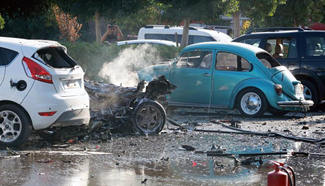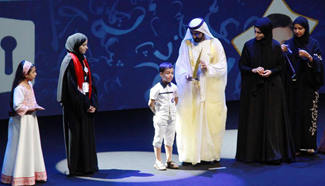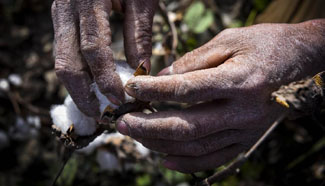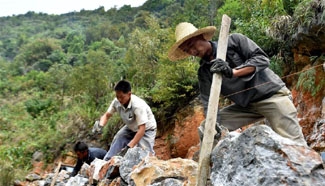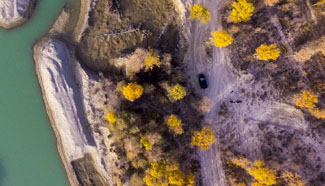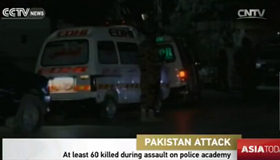GAZA, Oct. 25 (Xinhua) -- The dire conditions in the Gaza Strip could influence the coming generation of youth to become increasingly prone to violence, warned a United Nations (UN) official during an exclusive interview with Xinhua.
"The consequences of the entire situation definitely affect the hope and the possibility for the youth generations to find jobs and new ideas that can lead to a much more peaceful environment and prospects," Bo Schack, director of the United Nations Relief and Works Agency for Palestinian Refugees in the Near East (UNRWA) operations in Gaza, told Xinhua.
Israel has had the Gaza Strip under a tight blockade since the Islamic Hamas movement, one of Israel's archenemies, seized power by force after defeating Palestinian President Mahmoud Abbas' security forces in 2007.
Schack noted that the unemployment rate is almost over 40 percent in Gaza. But for young university graduates, it may be between 70 and 80 percent, meaning "a young person coming out at the start of setting up a family to live is seriously impeded."
The situation has other negative consequences such as increasing drug use and crime rates caused by low prospects, he said.
"There are very few opportunities to pass either the Erez crossing into Israel or the Rafah crossing into Egypt. These are aspects that could lead to very different directions," Schack warned, adding "the consequences of the blockade, the concern about electricity, energy, water with very poor quality have formed a situation that may only get worse."
Israel waged three wars against Gaza in the past decade which left substantial damage and a crumbling economy with high poverty and unemployment rates.
In 2014, Israel launched an all-out offensive against the Hamas-ruled Gaza Strip in order to stop Palestinian rockets from being fired into its territories, killing around 2,140 Palestinians and injuring over 10,000.
Schack stressed the importance of appropriately caring for the Gazan population, "otherwise the people here can indeed end up taking actions that might lead to a new conflict."
The UN official added that since the 2014 conflict, his organization has been involved in reconstruction efforts, starting with the UNRWA's premises and institutions which were affected or damaged by the war.
"We have been providing temporary support for housing allowance to those who are still without solutions," he affirmed. "We have also been repairing smaller damages with almost 70,000 families."
As for entirely demolished houses, Schack said a system has been in place since last summer.
"The first house was rebuilt only in October last year, but today we have 1,300 houses that have either been repaired or completed," said the official.
However, Schack complained of the troubles due to the existing blockade and the limited amount of cement allowed into Gaza, adding that the UN agency will soon reach the end of its funds for the reconstruction process.
Following the 2014 conflict, international donors pledged 5.4 billion U.S. dollars towards reconstructing Gaza, yet, according to the World Bank, only an estimated 40 percent of the pledged amount had been disbursed since April 2016.
"We are still expecting new support in this respect, and the support in education, medical services and social service, which are part of our core activities for 1.3 million Palestinian refugees in Gaza," Schack explained.
Concerning the UNRWA's financial crisis, Schack said there is a shortfall of about 70 million dollars for core activities, including education, constructing new schools, as well as medical and social services.
Despite the financial difficulties, Schack said the UNRWA has a mandate to continue supporting Palestinian refugees, and the agency is reconstructing demolished homes.
Two years ago, the UN issued a report warning that by 2020, the situation in Gaza would render it an uninhabitable environment due to water shortage, lack of jobs and deteriorating medical, social and educational services.
The official said steps must be taken to deal with these vital issues, in order to restore hope for the frustrated and desperate Gazan population.


